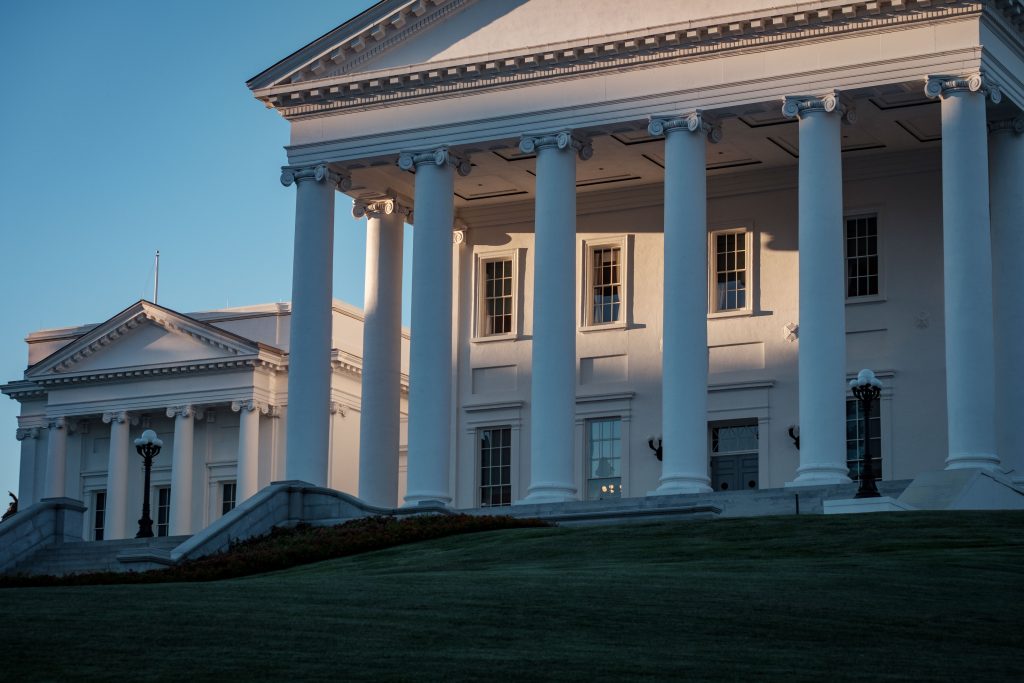The Virginia State Capitol. (Ned Oliver/Virginia Mercury)
By Graham Moomaw
(VM) – When Virginia Democrats wrapped up the 2021 General Assembly session, there were at least two big pieces of unfinished business.
Because constitutional amendments need to pass two years in a row before being put to voters, Republicans’ big wins Tuesday raise new doubts about efforts to get rid of Virginia’s now-defunct ban on same-sex marriage and automatically restore voting rights to felons once they’ve completed their sentences.
Both proposals won initial passage this year with some Republican support. Whether they’ll pass a second time, which would put the questions on ballots for the 2022 election, now depends largely on how the new, 52-48 GOP majority in the House of Delegates chooses to handle them.
“The new and expanded caucus has yet to meet,” said Garren Shipley, a spokesman for House Minority Leader Todd Gilbert, R-Shenandoah, who’s vying to become the next House speaker. “And members will need to discuss these amendments.”
The proposed amendment on voting would do away with a lifetime felon disenfranchisement policy enshrined in the state Constitution. Previously, people who wanted to regain their voting rights had to petition the governor. Former Gov. Terry McAuliffe and current Gov. Ralph Northam have used their powers broadly to restore voting rights to hundreds of thousands of ex-offenders, characterizing the effort as a racial justice measure meant to restore ex-offenders’ standing as full citizens with an equal stake in democracy.
The amendment pending in the General Assembly gets rid of the governor’s role and makes the process automatic “upon release from incarceration.” The amendment passed the Democratic-controlled House this year on a 56-40 vote with support from two Republicans.
Gov.-elect Glenn Youngkin has not yet indicated his stance on restoring voting rights for felons, but he ran a campaign ad criticizing McAuliffe’s sweeping approach to voting rights for making it easier for ex-convicts to get guns. Civil rights restoration in Virginia doesn’t automatically restore gun rights, but it allows ex-offenders to petition a court to regain the ability to possess firearms. In the past, Republicans have pushed for requiring ex-offenders to complete all phases of supervision and pay off any fees before regaining the right to vote.
Del. Marcus Simon, D-Fairfax, the current chair of the House committee that handles constitutional amendments, said he doubts Republicans will go for the felon voting proposal given their law-and-order and election integrity messages from the 2021 campaign.
“I think it’d be difficult for them to pivot to allowing anyone who’s not physically in a state prison to vote,” Simon said.
The second constitutional amendment pending in the statehouse is more symbolic. It would do away with the same-sex marriage ban Virginia voters approved in 2006, which no longer has any legal power after the U.S. Supreme Court legalized gay marriage nationwide in 2015. Supporters of the amendment pitched it as a forward-looking gesture meant to show Virginia has broken from its past and now embraces LGBTQ equality.
Despite that amendment having little tangible impact, most House Republicans opposed it this year in a 60-37 vote. However, about a half-dozen Republicans voted with Democrats to approve it, enough for it to potentially pass again should it come to a floor vote next year. But Republican leadership could keep the amendment bottled up in committee.
Simon said he hopes the House GOP will allow a floor vote on the marriage amendment and “let the people of Virginia decide” the question next fall. He’s not confident that’s how it will play out.
“Do I expect them to do the right thing in this case?,” he said. “Probably not.”
This story was originally published here:
The Virginia Mercury is an independent, nonprofit online news organization covering Virginia government and policy.



